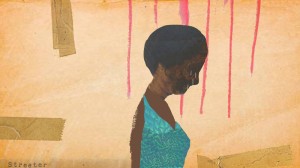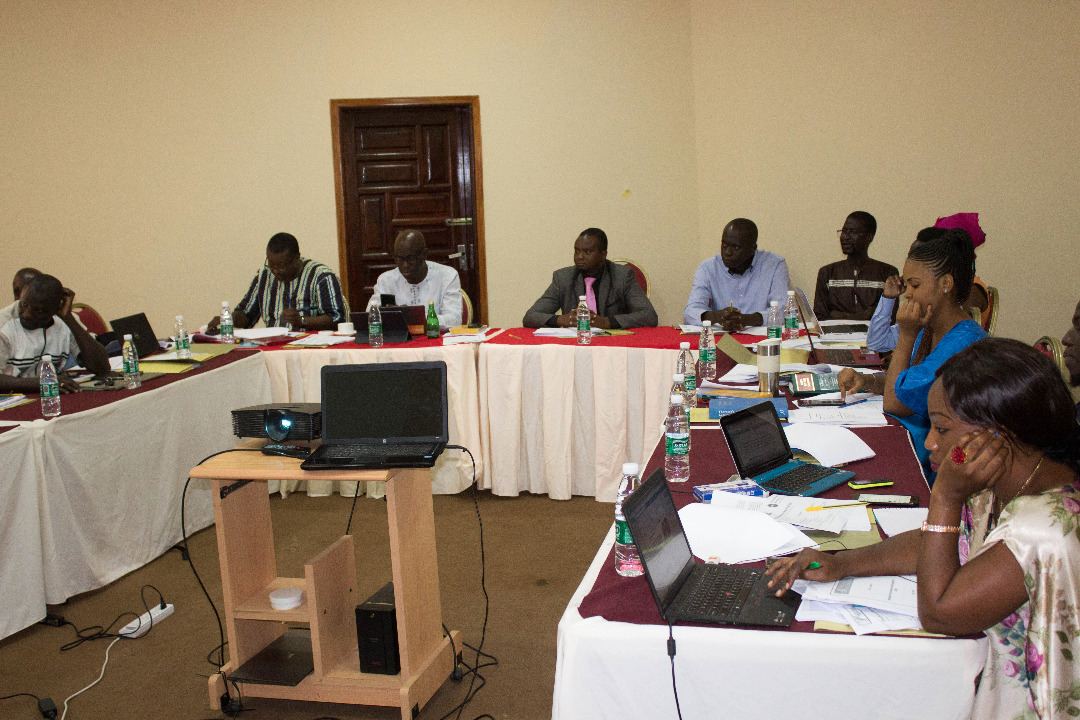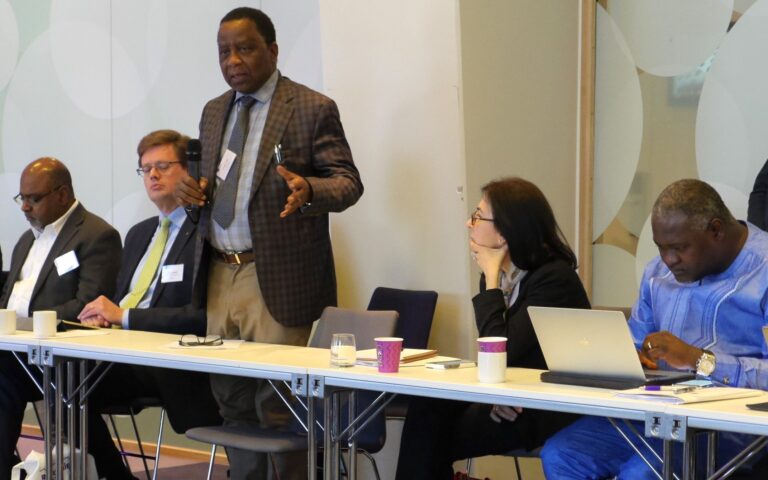Sold Into Sex Slavery: The Plight Of African Women Migrating To Europe
July 17, 2015
By LAUREN FRAYER*
 While reporting on the drama of African migrants crossing the Mediterranean Sea to Europe, I've been startled by how many of them are pregnant or are traveling with a very young child.
When I'd ask why, they'd say they wanted to give birth in the safety of Europe.
But as I investigated, I learned there could be another, more ominous reason: Some of these pregnant women may be victims of sexual violence on the long route northward to Europe from sub-Saharan Africa — journeys that can take years.
"Sex is traded just like money, to bribe border guards or police," said Encarnación Marquez, a social worker who helps migrants in Algeciras, on Spain's south coast. "Some migrants sell sex to human traffickers, in exchange for smuggling them into Europe. This is the tragedy no one talks about."
There's scant access to contraception along the journey northward from sub-Saharan Africa to Europe. Backroom abortions are common, Marquez said. And the abuse doesn't end when they arrive in Europe. Thousands of African women are sold into sexual slavery that continues even after they arrive in Europe, she said.
"We find women who think it's over, and that they can finally breathe a sigh of relief because they've arrived in a country with human rights. But they end up in a dancing bar on the side of the highway, imprisoned in a brothel and unable to escape," Marquez said. "They don't know where to go."
Marquez says enslaved prostitutes are often forced give all their wages to human traffickers, to reimburse them for travel costs from Africa to Europe. For months, I searched for a victim who'd be willing to tell me her story. But many recently arrived migrants are so frightened about being deported, they clam up when I ask them about prostitution or sexual violence.
Then one day, in a tiny office near a Madrid square known as a hangout for African prostitutes, I met Nancy, who didn't want to give her full name for fear of retribution.
Nine years ago, a man and woman came to Nancy's native village in southern Nigeria and offered to take her to Europe. She trusted them, because they were acquainted with one of her cousins. The couple met Nancy's parents, and promised to keep her safe. They even performed a traditional Nigerian ceremony — what some people refer to as voodoo — to seal the deal. Nancy was 18 years old at the time, studying to become a tailor. The couple promised to keep her safe and get her job as a fashion designer in Spain.
Nancy and her family pledged to repay them for the travel costs. But barely days into their journey, in the Nigerian megacity of Lagos, the couple told Nancy the truth: She would be forced to work as a prostitute to pay off her debt — first in Lagos, and then in Europe. "You need to use your body to work for that money. You need to suffer for that money," Nancy said. "And the most painful part is, that money [you earn through prostitution] is not for you. You are working it off to give to another person — a woman like you, or a man."
Nancy's traffickers told her she owed them the equivalent of about $50,000 for the cost of her travel and fake documents. She'd never been to Europe and had no idea how much such things cost — though a one-way airline ticket from Lagos to Barcelona, the route Nancy took, typically costs around $500. The traffickers threatened Nancy and her family. "They said that if I didn't pay that money, they are going to kill me — and kill my mother," Nancy said. "I didn't have any documents. I didn't have any money. I didn't have anywhere to go!"
Nancy also believed that the voodoo ceremony they performed in her home village bound her to her traffickers irrevocably, until her debt was paid. Otherwise, her family could be struck down by a curse, she believed. So she worked as prostitute for seven years in roadside brothels across Spain. "We started work by 5 o'clock in the afternoon and we ended at 6 o'clock in the morning — every day," she recalled about her time enslaved in brothels in Barcelona, La Coruña, Valencia and Madrid. "In one night, maybe I would be with five or six people."
She lived upstairs in the brothels, or sometimes in apartments shared by dozens of enslaved prostitutes, to which only their traffickers had keys. They were given food and clothes only when they worked. And all their wages went straight to the traffickers.
While reporting on the drama of African migrants crossing the Mediterranean Sea to Europe, I've been startled by how many of them are pregnant or are traveling with a very young child.
When I'd ask why, they'd say they wanted to give birth in the safety of Europe.
But as I investigated, I learned there could be another, more ominous reason: Some of these pregnant women may be victims of sexual violence on the long route northward to Europe from sub-Saharan Africa — journeys that can take years.
"Sex is traded just like money, to bribe border guards or police," said Encarnación Marquez, a social worker who helps migrants in Algeciras, on Spain's south coast. "Some migrants sell sex to human traffickers, in exchange for smuggling them into Europe. This is the tragedy no one talks about."
There's scant access to contraception along the journey northward from sub-Saharan Africa to Europe. Backroom abortions are common, Marquez said. And the abuse doesn't end when they arrive in Europe. Thousands of African women are sold into sexual slavery that continues even after they arrive in Europe, she said.
"We find women who think it's over, and that they can finally breathe a sigh of relief because they've arrived in a country with human rights. But they end up in a dancing bar on the side of the highway, imprisoned in a brothel and unable to escape," Marquez said. "They don't know where to go."
Marquez says enslaved prostitutes are often forced give all their wages to human traffickers, to reimburse them for travel costs from Africa to Europe. For months, I searched for a victim who'd be willing to tell me her story. But many recently arrived migrants are so frightened about being deported, they clam up when I ask them about prostitution or sexual violence.
Then one day, in a tiny office near a Madrid square known as a hangout for African prostitutes, I met Nancy, who didn't want to give her full name for fear of retribution.
Nine years ago, a man and woman came to Nancy's native village in southern Nigeria and offered to take her to Europe. She trusted them, because they were acquainted with one of her cousins. The couple met Nancy's parents, and promised to keep her safe. They even performed a traditional Nigerian ceremony — what some people refer to as voodoo — to seal the deal. Nancy was 18 years old at the time, studying to become a tailor. The couple promised to keep her safe and get her job as a fashion designer in Spain.
Nancy and her family pledged to repay them for the travel costs. But barely days into their journey, in the Nigerian megacity of Lagos, the couple told Nancy the truth: She would be forced to work as a prostitute to pay off her debt — first in Lagos, and then in Europe. "You need to use your body to work for that money. You need to suffer for that money," Nancy said. "And the most painful part is, that money [you earn through prostitution] is not for you. You are working it off to give to another person — a woman like you, or a man."
Nancy's traffickers told her she owed them the equivalent of about $50,000 for the cost of her travel and fake documents. She'd never been to Europe and had no idea how much such things cost — though a one-way airline ticket from Lagos to Barcelona, the route Nancy took, typically costs around $500. The traffickers threatened Nancy and her family. "They said that if I didn't pay that money, they are going to kill me — and kill my mother," Nancy said. "I didn't have any documents. I didn't have any money. I didn't have anywhere to go!"
Nancy also believed that the voodoo ceremony they performed in her home village bound her to her traffickers irrevocably, until her debt was paid. Otherwise, her family could be struck down by a curse, she believed. So she worked as prostitute for seven years in roadside brothels across Spain. "We started work by 5 o'clock in the afternoon and we ended at 6 o'clock in the morning — every day," she recalled about her time enslaved in brothels in Barcelona, La Coruña, Valencia and Madrid. "In one night, maybe I would be with five or six people."
She lived upstairs in the brothels, or sometimes in apartments shared by dozens of enslaved prostitutes, to which only their traffickers had keys. They were given food and clothes only when they worked. And all their wages went straight to the traffickers.
Nancy said she suffered violence at the hands of both her traffickers and her clients. She described one incident in northern Spain when a client injured her, and a subsequent infection sent her body into shock, and she believed she was dying. No one took her to the hospital. A fellow prostitute nursed her back to health, hidden upstairs in the brothel. She believes the incident left her infertile. Her traffickers told her she owed them money for the days she was ill and unable to work.
She never managed to pay off the $50,000 — and finally reached the point where she didn't care if she lived or died. "I said, 'Well, if you want to kill me, you can kill me,' " she recalled. "Because I'm so tired and I can't do this work anymore. I'm ready to die now." That very day, two years ago, Nancy walked into a Madrid police station. For years, her traffickers had told her she'd be jailed if she told the truth. But what she didn't know then is that in Spain, prostitution is not illegal — trafficking prostitutes is. She gave police descriptions of her captors, but Nancy believes they fled the country after she went to the police, and that they are still working as traffickers of prostitutes elsewhere in Europe.
Nancy started working with a charity called
APRAMP, to help fellow victims of human trafficking. The charity helped Nancy obtain residency in Spain. Today she has her own apartment and works as a first responder — often the first to be called to the police station when enslaved prostitutes decide they can't take it anymore and seek help from authorities.
Nancy has also helped APRAMP map the main routes of human trafficking from sub-Saharan Africa to Europe, based on her interviews with survivors, and sends teams to educate migrants about the dangers along those routes. "I've worked with many girls and they tell me their stories. For the road journey, there are a lot of countries that we have to pass — like Niger, Mali, Cote D'Ivoire, Guinea," she says. "Getting pregnant on that road is not their desire. It's just that they don't have another option. Women are forced into prostitution at every border crossing."
It's difficult to know how many women have been in Nancy's shoes, because they enter the country illegally and are undocumented. Spanish authorities don't know they're here. But APRAMP says it assists some 1,300 new victims a month in Spain alone. And experts believe the real number of women — many of whom are too scared or unable to seek help — is much higher. "They normally come from small African villages, and they don't know about international travel. So they're most vulnerable to be cheated," says Rocío Mora, a Spanish lawyer who works with APRAMP on a pro bono basis, helping arrange residency and working papers for survivors. "They don't know that passports shouldn't be bought through a criminal network — and that the journey doesn't cost $50,000. They don't know any other way. Many of them end up pregnant by the time they reach the Mediterranean coast."
It's 21st century slavery, Mora says, happening right under our noses. Last year, Mora helped arrange for Nancy to return to Nigeria for the first time, to help educate women — potential migrants — about the dangers on the route northward toward Europe.
"We need to tell these stories there in Africa, before they come here," Mora says. "Because by the time they arrive in Spain, they're enslaved already. They rely on their captors for food, clothes — for their entire life. Those are hard shackles to break."
Nancy says it's still painful to tell her story, but she does so in hopes of saving other African women from enduring what she did. She's proud to tell people what her profession is now. "I love to tell my story! It's what gives me the ability to move forward," she says. "Because the beginning was a tragedy, but the end is joy."
*Source
NPR



















